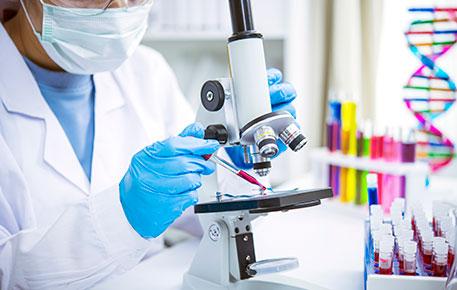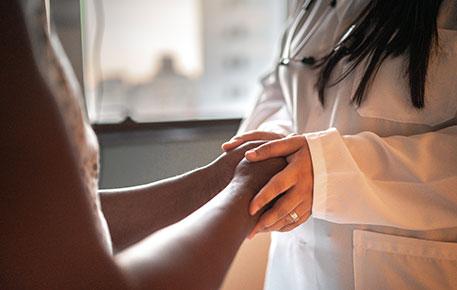Neuroblastoma Biology Studies: A Children's Oncology Group Study
Please contact the Cancer Center Clinical Trials Office for more information and for screening.

Stem cell transplants, also called bone marrow transplants, treat high-risk and life-threatening blood diseases. If you have leukemia, lymphoma, or other blood cancer, a stem cell transplant could be the right option for you.
A stem cell transplant still requires chemotherapy and sometimes, radiation. However, if successful, a stem cell transplant can offer a lot of hope.
Find out what to expect from the bone marrow transplant procedure and recovery. More questions? Read our FAQs.
Karen Ballen:
Stem cells are blood-forming cells that live in our bone marrow. When someone has a blood cancer such as leukemia, that bone marrow, the place that makes all of our blood cells, our factory for the blood cells, is damaged. What a transplant does is it gets rid of those damaged cells with high doses of chemotherapy, or in some cases, chemotherapy and radiation therapy, and then it replaces the abnormal bone marrow with completely normal bone marrow and blood-forming stem cells from a normal donor. The diseases that transplant is used for are cancers of the blood, such as leukemia, lymphoma, and multiple myeloma, and some other blood diseases that are very serious but are not cancer, such as sickle cell anemia or aplastic anemia. In general, the cure rate is between 40 and 70%. We want to make sure that the transplant is the appropriate treatment for each patient and that it is safe as possible, and each patient will undergo testing of their heart and lung function, kidney and liver function, to make sure that they're healthy enough for transplant.
Going through a stem cell transplant is a journey, and we're here with them every step of the way. For the patients, it's a big commitment. They may often be in the hospital for several weeks, and then for some transplants they need to stay here in Charlottesville for several weeks with a caregiver. After that, they'll return to their own home and the care of their own oncologist, and we'll work very closely with their local physicians to make sure that they're getting the best care possible, even if they're not here in Charlottesville. So my research is involved in making sure that every patient has a donor. 5 or 10 years ago, this was really a barrier to transplantation, and it's difficult for patients of non-European background to find donors in the registry.
John L. Wagner:
You have larger numbers of patients that are eligible for therapy. When I started, if you were over 50, this wasn't an option. Now, the median age is about 66 or 67 for the patients.
Karen Ballen:
But with modern techniques, using donors that may be a family member that might not be a match, using blood that is saved from the umbilical cord, and using other ways to prevent post-transplant complications, we've been able to find a donor for every patient. So we are doing research in what we call post-transplant maintenance, which is giving very low doses of chemotherapy or antibody therapy after transplant to prevent cancers from coming back. This is a novel treatment and is only available here at UVA Health. Third area of research is to prevent infections after transplant, and we've done some interesting studies looking at diet. And interestingly, we are looking at ways to change people's diet that may reduce the risk of getting infections in their gut or gastrointestinal tract after transplant.
John L. Wagner:
UVA is a comprehensive cancer center. We are a relatively large program, and just like in certain surgical procedures, the more experience you have, the better your outcomes.
Karen Ballen:
I think what makes our team so special is that we are just such a great team, and we're all really dedicated to the patient and making the patient the center of everything that we do.
At UVA Health, you can trust in our excellent outcomes and deep experience in providing bone marrow transplants. The honors we've earned show the high quality of our care. We've been recognized:
We're at the cutting edge of stem cell transplant research. When you come to UVA Health, you'll have access to:
Taking part in a clinical trial means you get the very latest medicine. Talk to our team about how you can join an open clinical trial.
Please contact the Cancer Center Clinical Trials Office for more information and for screening.
The University of Virginia Health System is seeking children with chronic kidney disease ages 1-16, for a research study on Chronic Kidney Disease. The purpose of this study is to determine the risk factors for decline in kidney function and to define how a progressive decline in kidney function impacts learning and behavior, risk factors for heart disease and growth. A total of 5 study visits are required each visit lasting 4-7 hours. The study duration is 4 years. Blood tests, urine tests, kidney function test, cognitive tests and ECHOs are also required. All study-related procedures are provided at no cost to the participant. Payment for study completion is $175.00 for visits 1a, 2 and 4 and $75.00 for visits 1b and 3. For more information contact Lisa Workman 434-924-1803 or email [email protected] Primary Investigator Dr. Vicki Norwood HIC # 11777
UVa Health System, Department of Medicine- Pulmonary Division seeks adults, ages 18 to 65, for a research study. The purpose of the study is to investigate how cigarette smoke induces chronic obstructive pulmonary disease. Study involves one time blood draw, sputum, urine, and/or lung sample collection, possible breathing test (spirometry) all to be done during one visit lasting 60 minutes. You may qualify if you: § Are a smoker OR a non-smoker § have healthy lungs OR § have chronic obstructive pulmonary disease (COPD), chronic bronchitis or emphysema Study-related tests provided free of charge. Compensation for study completion is $20.00 For more information please contact: Yun Michael Shim, MD Primary Investigator: Yun Michael Shim, M.D.
The Asthma and Allergic Diseases Center is seeking volunteers for a research study on eczema and asthma. Please call if you meet the following qualifications: * Male or female 18 to 60 years of age * Diagnosed with Atopic Dermatitis (Eczema) or Asthma. Volunteers will be asked to fill out a questionnaire and have a blood test. You will be compensated for your participation. For further information, please call: - Lyndsey Muehling (434) 924-1114 924-1114 -Judith (434) 924-1293
UVa Health System, Department of Orthopaedic Surgery, Division of Pediatrics, seeks children and adults ages 8 to 21 with neuromuscular scoliosis for a research study. The purpose of the study is compare surgical vs non-surgical management of neuromuscular scoliosis in children with cerebral palsy. Study involves filling out a 30 minute questionnaire and a routine clinical exam. There will be 4-6 study related visits that correspond to normal clinic follow-ups. Each visit will last approximately 60 minutes. Participant’s insurance company will be billed for tests and procedures associated with clinical care. Participants will be compensated $50 for completing the questionnaire. For more information please contact: Ashley Byrne (434) 243-0289, [email protected] IRB-HSR # 13588 Principal Investigator: Mark F. Abel, MD

Stem cells live in your bone marrow. There, they create red blood cells, white blood cells, and platelets. Blood cancers and disorders stop stem cells from creating normal blood cells.

If you're the relative of someone in need of stem cells, we can talk with you about the process of testing and donation. You can also sign up for the national registry.

Is stem cell transplant an option for you? Stem cell transplant can treat a number of cancers and blood disorders. Let us help you determine if stem cell transplant could be the right answer for you.
